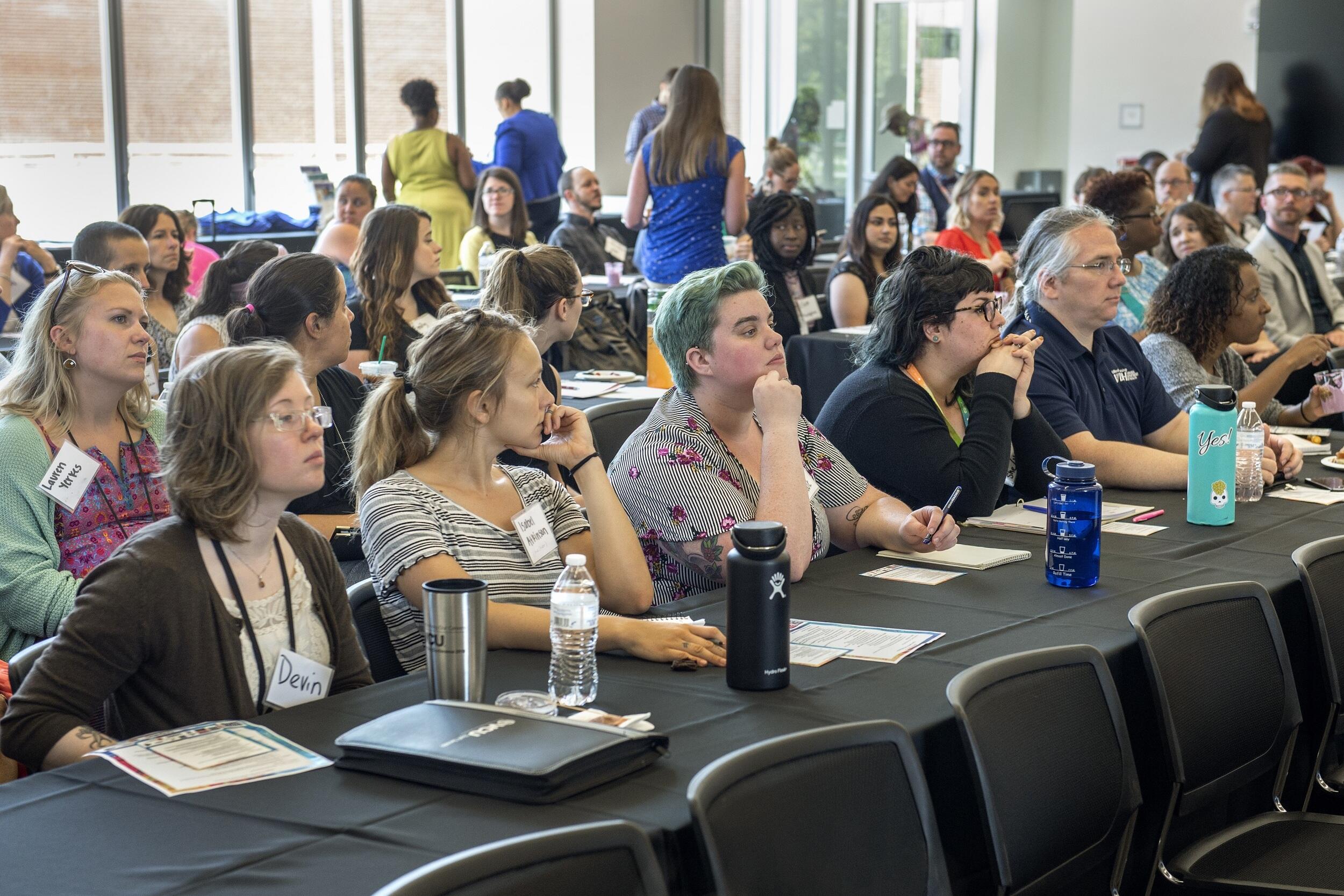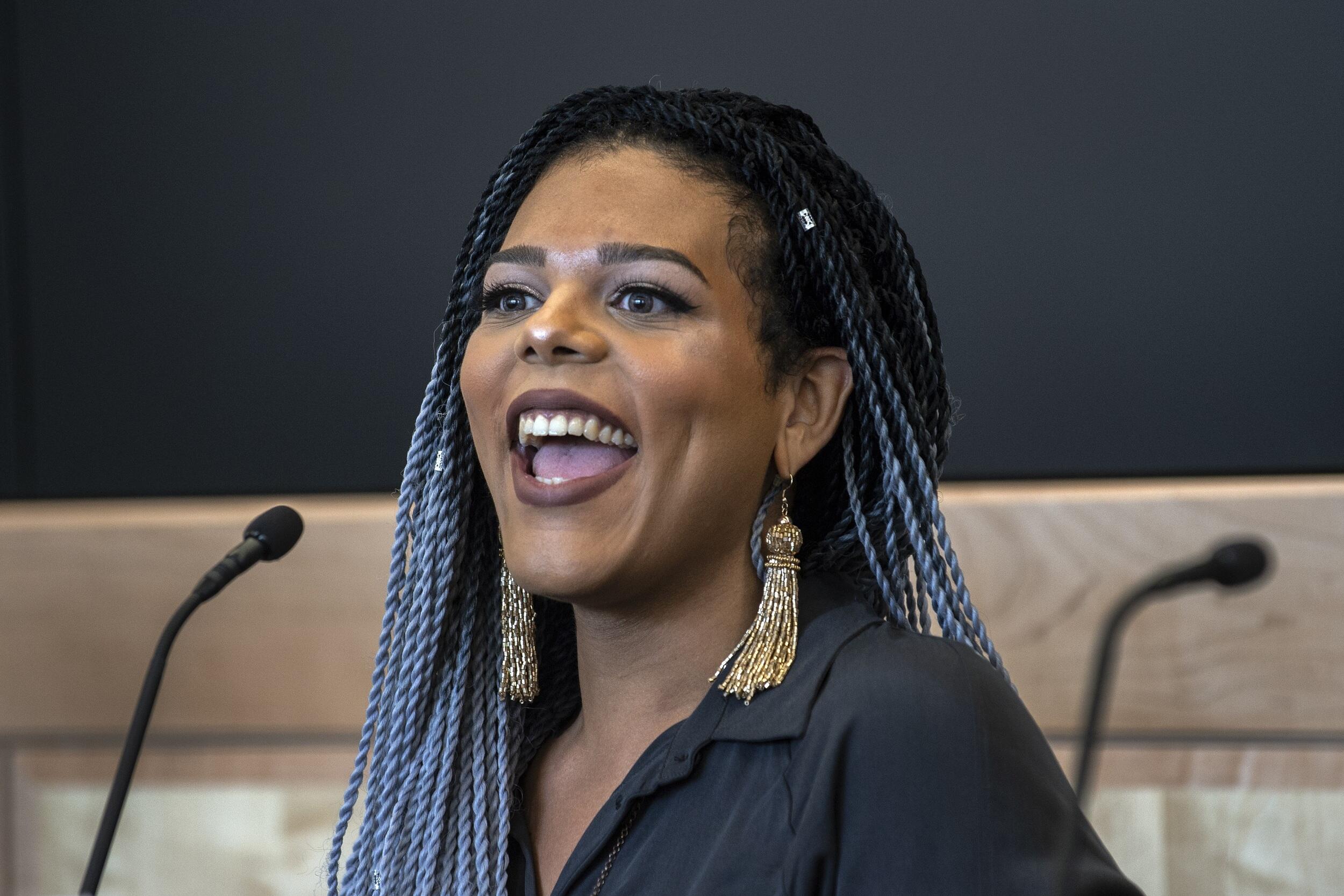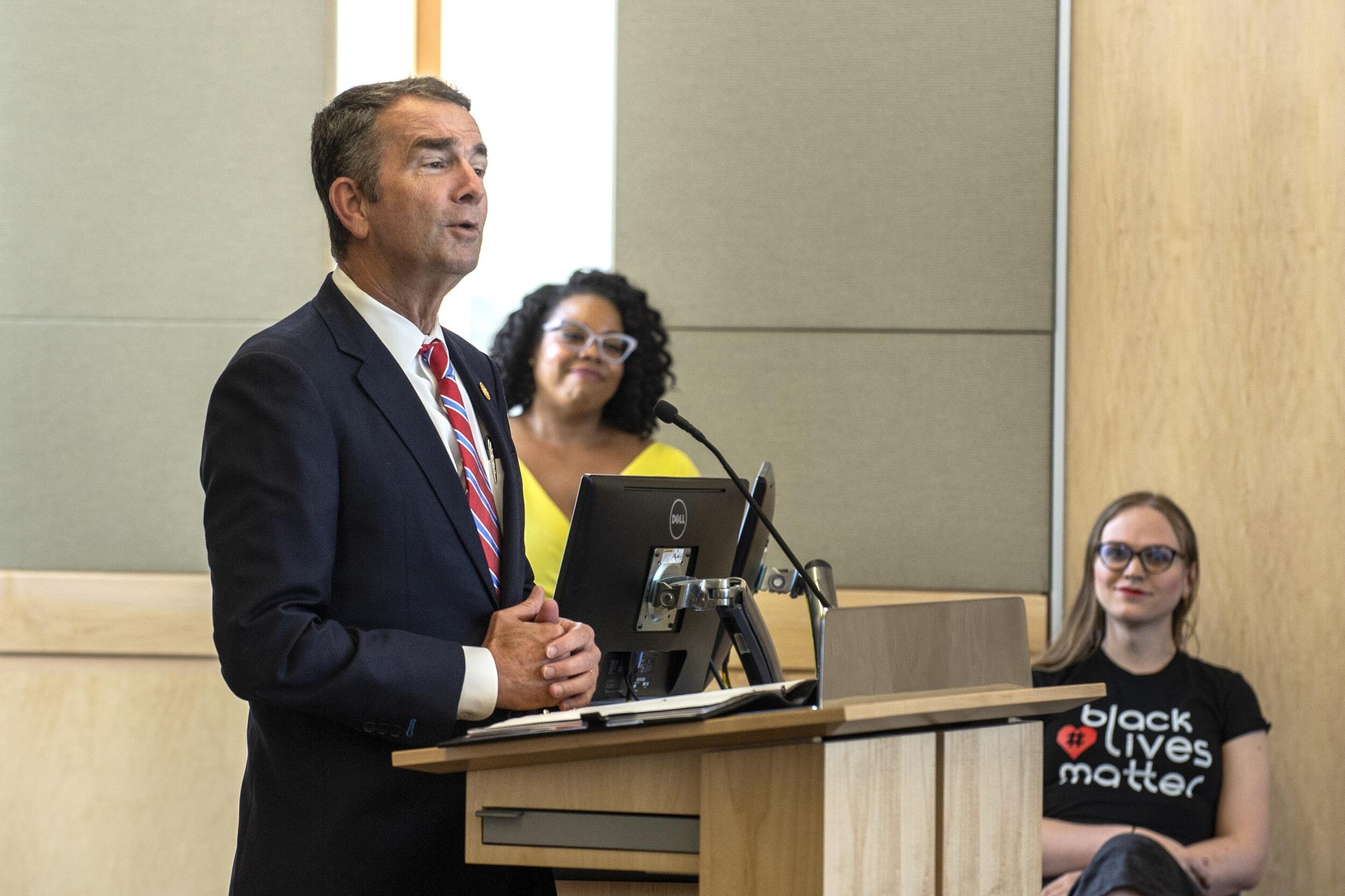
June 28, 2019
At VCU, symposium explores LGBTQ+ health equity in Virginia
Share this story
The Virginia Department of Health’s Office of Health Equity on Thursday convened policymakers, health care professionals, elected officials, community members and allies at Virginia Commonwealth University to discuss the state of LGBTQ+ health care.
“The Fierce Urgency of Now: Virginia’s LGBTQ+ Health Equity Symposium,” held in James Branch Cabell Library, was a daylong event coinciding with Pride Month that aimed to highlight the resiliency of the LGBTQ+ community, while also taking an honest look at who’s been left behind in the strides that have been made forward. The event focused on health equity for LGBTQ+ people and on improving health outcomes beyond HIV/AIDs.
Archana Pathak, Ph.D., senior faculty specialist with the VCU Division for Inclusive Excellence, opened the event with a welcome to attendees.
“What a pleasure it is to have such an event here on our campus,” Pathak said. “LGBTQ communities have been around for quite a while — maybe not always public, maybe not always visible, but always present. However, it’s not just about a presence. It’s about inclusion and our integration into the broader fabric of our communities and our world.”
Pathak, who is also an assistant professor in the Department of Gender, Sexuality and Women’s Studies, said VCU has introduced four major LGBTQ-related initiatives in the past year, including the hiring of faculty with expertise in LGBTQ studies across departments, the launch of an LGBT+ and queer studies minor, a new iCubed core titled “Intersections in the Lives of LGBTQIA+ Communities“ that focuses on multiple marginalized groups, and the Q Collective, a queer research and advocacy center.
“It’s clear that VCU’s leadership ... is committed to creating an inclusive space,” Pathak said. “And this conference is a wonderful way to launch a new year for us at this institution, because it invites us to think about and consider the ways that we not just understand diverse populations but recognize them as the lifeblood of who we truly are.”

Del. Danica Roem, the first transgender person to be elected to the Virginia General Assembly, delivered a keynote address. She talked about how she is often the only trans person in the room where major policies are being considered, such as at a recent gathering of health insurance industry officials and medical professionals on trans-specific health care.
“We had four or five trans folks who were there, me being the only trans person who is in a position of power though in terms of dealing with the health insurance lobby,” Roem said. “And I’m listening to health insurance people, to other folks who are professionals in the health care industry, debate my health care without any of them having to actually have the lived experience about what it means to be a trans person pursuing health care. You look at that, and have a really startling realization in that moment, which is [that] a lot of people who have no idea what it’s like to be me are deciding my fate right now.”
Trans people can have specific health needs, such as hormone replacement therapy, mental health services and more, but those needs often face barriers from medical professionals who lack understanding.
“LGBTQ people never get what we want the first time that we ask for it. We have to be persistent,” Roem said. “We have to be resilient and every time that we have setbacks — and we will — we have to rally and figure out how to take that learned experience, that lived experience, and turn it into something better. For a lot of people, it’s too late because they’re already dead. For a lot of people, it’s too late because, as we are speaking right now, there are people who are having mental health crises all across this country and some of them will die today. … It’s too late. But we cannot let defeatism, we cannot let nihilism keep us from making our imperfect union a better union, a better place as we get closer and closer to figuring out how we can bring more justice, how we can liberate more people, how we can truly act in the interest of equality, of equity, of inclusivity.”
At a panel titled “Double Jeopardy: Experiences of People of Color in the LGBTQ+ Community,” Austyn Higgs, program manager with the VCU Office of Continuing and Professional Education, talked about her experience as a trans woman of color seeking health care.
“When we think of health care for folks of transgender experience, we think that there are a lot of barriers ... but then we also think that no human belongs to just one identity. Myself, I am a person of color, I am transgender, I come from under the poverty line,” she said. “So a lot of my identities can lend to both amazing experiences and a richness of diversity but also discrimination that ends up compounding on itself. … We know that medical equity is somewhat lacking for the black community or communities of color, for the trans community and for the femme communities. And I represent all three of those.”
Higgs described having to interact with doctors who made incorrect assumptions about her life, and how challenging it is to find mental health care that meets her specific needs.
“[We have] doctors who don’t listen to us. And I’ll never know if that’s because I’m trans, or if I’m black or if I’m femme, or, growing up, I didn’t know if it was because I come from under the poverty line,” she said. “So I face a lot of issues and barriers — and right now I’m having a really hard time finding a therapist who checks all the boxes: is a woman of color, is LGBT affirming, who is understanding of what it looks to be not just LGBT affirming but trans affirming, and is knowledgeable about how [hormone replacement therapy] affects mental health. And so when I check all the boxes in my medical provider website, literally it said no one in my area. And so that’s harmful for me because I feel like I’m not going to be able to trust the person if they don’t check all those boxes because those are all salient identities for me.”

Gov. Ralph Northam also spoke at the event, saying that he wants to send a message to the LGBTQ+ community that: “You are welcome here in the commonwealth of Virginia. We care about your health and well-being, and that of your families.
“We know that a disproportionate number of those in the LGBTQ community face economic vulnerability, violence and discrimination. People of color in the LGBTQ community bear a larger burden of these experiences because of the added impact of racism,” he said. “It is important that our commonwealth take steps to ensure that all people in Virginia are cared for adequately and without exception.”
Northam said that while the federal government is continuing to strip protections for LGBTQ+ people, Virginia is taking steps toward equity. For example, he said, his first executive order prohibited discrimination, including based on sexual orientation, among the state workforce, and last week he announced changes to make the state employment application process more fair and equitable, including allowing applicants to provide their own preferred pronouns.
“This is the 50th year anniversary of the slogan Virginia is for Lovers,” Northam said. “I think we need to add one word as we move on to the next 50 years and that is Virginia is for All Lovers.”
Subscribe to VCU News
Subscribe to VCU News at newsletter.vcu.edu and receive a selection of stories, videos, photos, news clips and event listings in your inbox.










